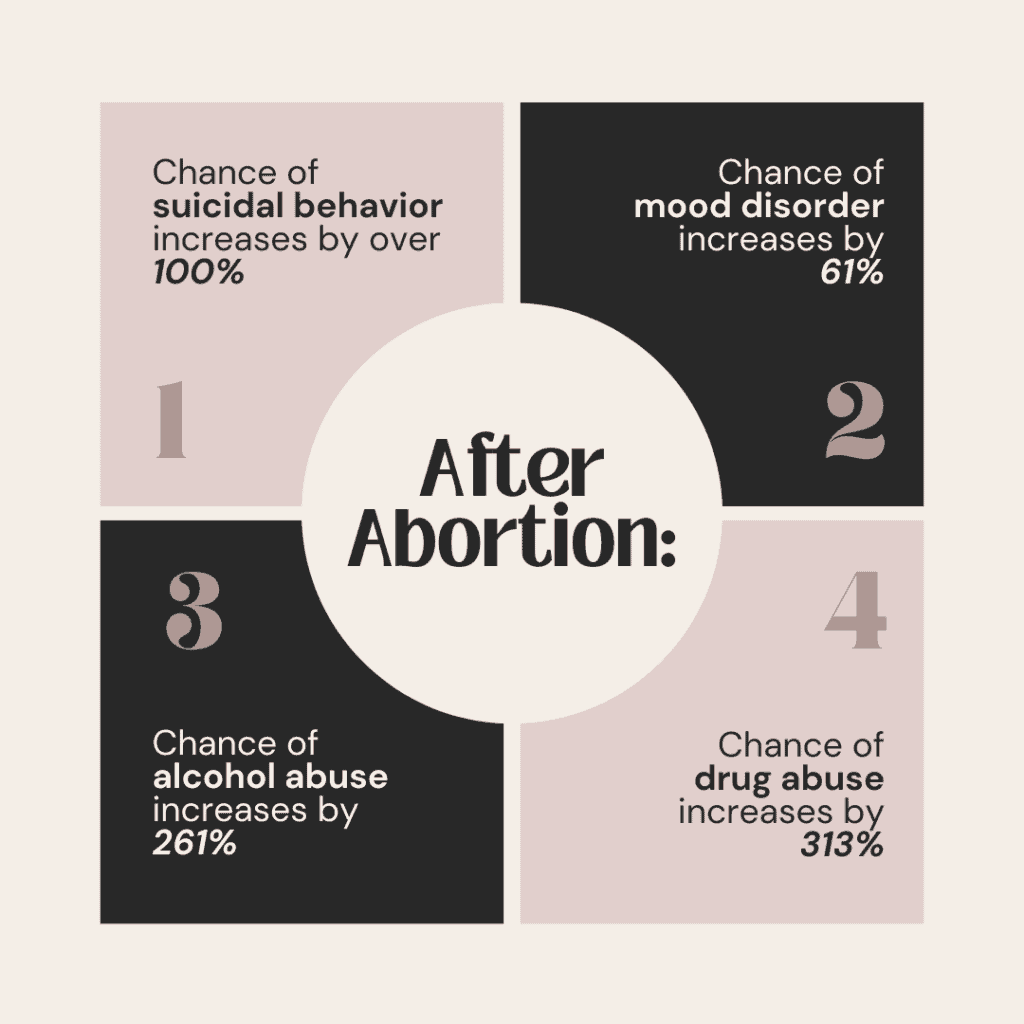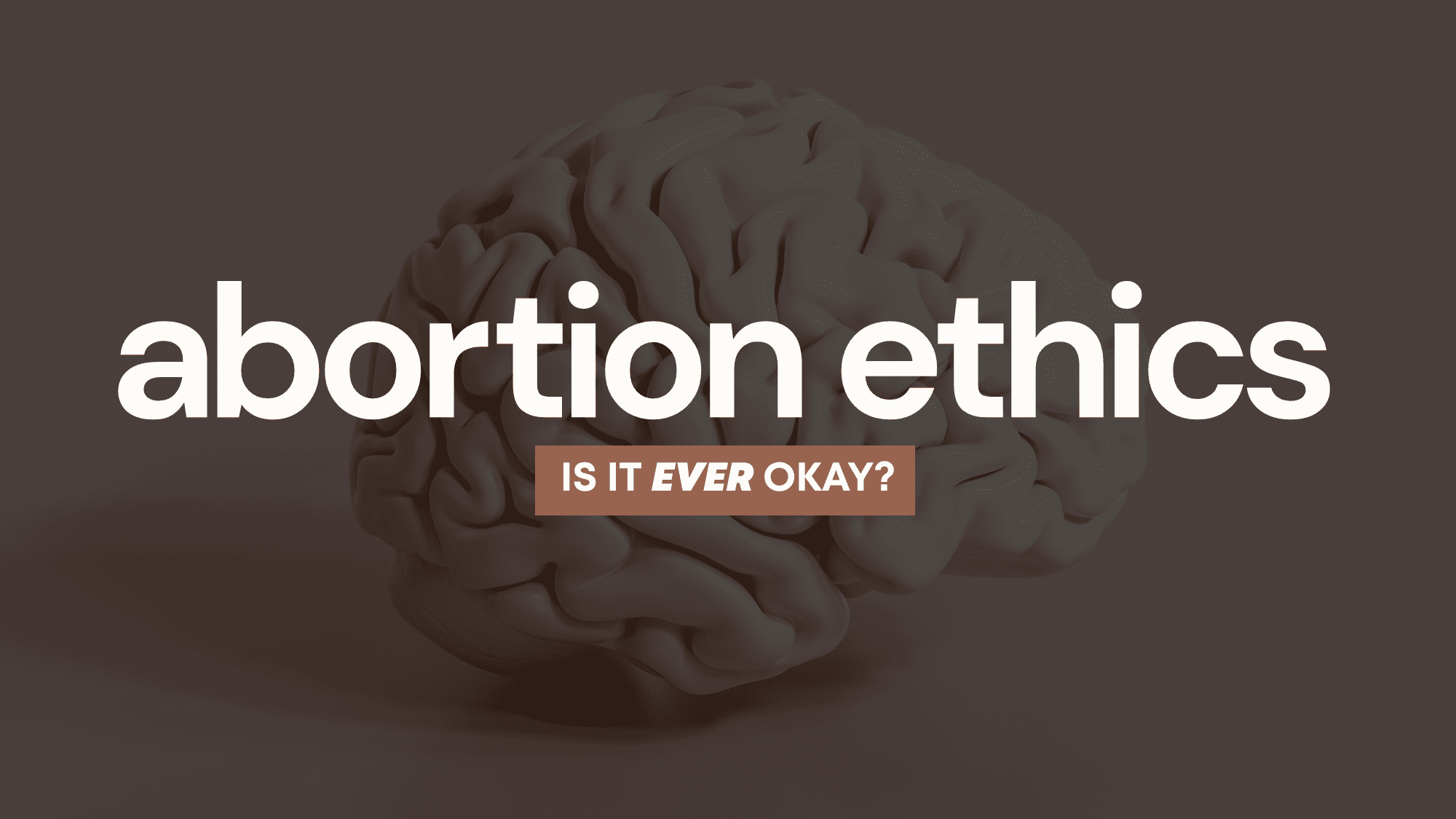Given our nation’s long history on abortion, it is clear this is not the “settled issue” proponents claim it is. The debate on the ethics of abortion rages white-hot as ever. It is a deeply consequential issue. So, asking serious questions about the ethics of abortion is something every citizen must examine, because the nature of what is growing in the womb is a fundamental human question.
The ethics of abortion really come down to four fundamental questions:
- What is abortion?
- Does it end an innocent human life?
- Is it good for women?
- Is it ever justified?
Let’s examine each.
What is Abortion?
Abortion is the act of ending life growing in a woman’s womb either by chemical or surgical intervention.
Does Abortion End a Life?

Abortion itself answers this question. If what is in the womb is not a growing life, why is there a need to end it? The procedure always starts with two lives and “success” dictates only one remains. That is the direct objective of abortion. Therefore, abortion is the only active medical procedure with the intention to end a life. Abortion is certainly not health-care. Health care preserves life. Abortion ends it.
On the question of innocence, what is more innocent than a baby growing in the womb?
Are They Human?
If that life is not human, what is it? Two human beings can only create human life.
The renowned human embryologist C. Ward Kischer explains in a foundational medical essay, “Virtually every human embryologist and every major textbook of human embryology states that fertilization marks the beginning of the life of the new individual human being.”
Princeton University explains that “human life comes into existence with the formation of the one-celled zygote.” You are the human your parents created at conception. The same is true for every preborn child.
Opinion of Abortion Advocates
In a BBC interview with reporter Hilary Andersson and Dr. LeRoy Carhart, a groundbreaking Maryland abortionist practicing over 30 years discusses the nature of his work.
Sitting together in his procedure room, Dr. Carhart tells Andersson, “The baby has no input in this as far as I’m concerned.”
Then, visibly surprised, the BBC reporter responds, “It’s interesting that you use the word ‘baby’ because a lot of abortionists won’t use that, they use the word ‘fetus’ because they don’t want to acknowledge that there’s a life.” Dr. Carhart answers directly, “I use them synonymously. I think that it is a baby and I use it with our patients.”
Andersson asks Dr. Carhart bluntly, “And you don’t have a problem with killing a baby?” He actually interrupts her, answering, “Absolutely not.” He continues, “I have no problem if it is in the mother’s uterus.”
Dr. Carhart is certainly not alone in this view.
A major 2022 commentary in The Nation admits in its banner headline, “Abortion Involves Killing – and That’s OK!” The author freely admits hers is “an argument in favor of abortion-as-killing.” She also proudly states:

“The distinction between making fetuses killable, and making it easy and stigma-free for people to take the decision to kill a fetus, is significant.”
Sophie Lewis, Abortion Advocate
Abortion advocates no longer think of abortion as something that should be regrettable and rare. Now, there are bold calls to proudly celebrate it by organizations like Shout Your Abortion, which exists to “aid and abet abortion.”
Is Abortion Good For Women?
When it comes to the wonder of a woman’s beautiful gift of fertility – that which only she can do – it is natural for her to give birth. Literally.
Everything in the profound intricacy of the feminine body begins toward this miraculous conclusion. Abortion is a sudden and drastic interruption of nature’s process. Consequently, this has a measurable impact on the mental health of women.
Dr. Christina Francis, a practicing, board-certified OB-GYN and CEO of the American Academy of Pro-Life Obstetricians and Gynecologists, in a 2022 testimony before Congress states, “Pregnancy is not a disease and elective abortion is not healthcare.” As such “elective abortion carries no maternal benefit.”
Additionally, data shows it carries significant harm.
“As demonstrated by hundreds of studies over nearly five decades, abortive procedures carry several deleterious effects for women, including risk of preterm birth and mental health problems.”
Dr. Christina Francis to Congress
Abortion Ethics Study #1
A meta-analysis in the British Journal of Psychiatry examined twenty-two separate studies examining post-abortive women and their mental health outcomes. This involved more than 877,000 women, 164,000 of whom had undergone an abortion. This article concluded:
Based on data extracted from 22 studies, the results of this meta-analytic review of the abortion and mental health literature indicate quite consistently that abortion is associated with moderate to highly increased risks of psychological problems subsequent to the procedure.

Every well-being outcome measured moved in a decidedly negative direction following the abortion.
- Anxiety disorders increased by 34 percent.
- Depression increased by 37 percent.
- Alcohol abuse increased by more than 100 percent.
- Suicidal behaviors increased by more than 100 percent.
- Marijuana use increased more than 200 percent.
Abortion Ethics Study #2
These increases remained even after controlling for prior psychiatric problems. A 2010 study in The Canadian Journal of Psychiatry was singled out for its significance in this British meta-analysis because the “results are startlingly similar.” It is explained, “Statistically significant associations were observed between abortion history and a wide range of mental health problems after controlling for the experience of interpersonal violence and demographic variables.” Compared with peers who had never undergone an abortion, women who did suffered:
- 61% increase in mood disorders;
- 61% increase in social phobia;
- 59% increase in suicidal ideation;
- 261% increase in alcohol abuse;
- 142% increase in alcohol dependence;
- 313% increase in drug abuse;
- 287% increase in drug dependence
- 280% increase in “any substance use disorder.”
Rather than solving a problem and relieving difficulty, abortion tends to create new ones.
An additional study by abortion-friendly medical researchers questioned such findings and sought to refute them. Their own meta-analysis surprised them, compelling them to admit, “Abortion was associated with small to moderate increases in risks of anxiety, alcohol misuse, illicit drug use/misuse, and suicidal behavior.”
These scholars further warn “it is our view that the growing evidence that abortion does not have therapeutic benefits cannot be ignored indefinitely, and it is unacceptable for clinicians to authorize large numbers of abortions on grounds for which there is, currently, no scientific evidence.”
When the Mother's Life is at Stake?
Is the treatment of life-threatening conditions, like ectopic pregnancy, the same as abortion? Actually, they are not. Treatment for an ectopic pregnancy is not an abortion. Dr. Francis is featured in a video reenactment that talks about this very topic.
Due to remarkable medical advances, abortions truly necessary to save the life of the mother are essentially non-existent. Doctors who care for women on both sides of the abortion debate have affirmed this fact over many decades.
On the pro-abortion side, Alan F. Guttmacher, a foundational leader for Planned Parenthood, wrote in his 1967 book, “Today it is possible for almost any patient to be brought through pregnancy alive, unless she suffers from a fatal illness such as cancer or leukemia, and, if so, abortion would be unlikely to prolong, much less save, life.”
One the pro-life side, former U.S. Surgeon General C. Everett Koop, M.D. explained in 1980, “Protection of the life of the mother as an excuse for an abortion is a smoke screen. In my 36 years in pediatric surgery, I have never known of one instance where the child had to be aborted to save the mother’s life.”
And just consider one simple fact about OB/GYNs as medical professionals. Each strives to provide the best, overall life-saving care for their patients. However, research from the Guttmacher Institute, the largest abortion advocacy research group in the world, finds that nearly all (93%) U.S. OB/GYNs do not perform abortions. How can most OB/GYNs be serving their patients well by refusing to perform something abortion advocates declare is “essential health care?”
Simple.

These doctors who have committed their lives to care for women and their well-being know abortion is not health care and it is not medically necessary.
Abortion Ethics: Is It Okay?
Abortion is ethically wrong because it is the deliberate ending of an innocent human life. It is not medically necessary and it harms women. As Dr. Christina Francis explained to the U.S. Congress in 2022, “abortion exists to solve a social problem, not a medical one.”
Christianity has understood these facts from its earliest days. Christian orthodoxy had a very direct and irrefutable rationale for its strong pro-life views.
- If abortion is needed to bring the death of a child, it must be living.
- If living, the child had to have received that gift of life from God, the giver of all life, and God is actively sustaining that new life in His goodness, even in the secret of the womb as Psalm 139 teaches:
“For you formed my inward parts; you knitted me together in my mother’s womb.”
- Therefore, abortion is to be condemned because it rejects the goodness and sovereignty of God.
And nothing that has developed in medical science serves to refute this wisdom. In fact, it only serves to support Christianity’s life-preserving insight.




















